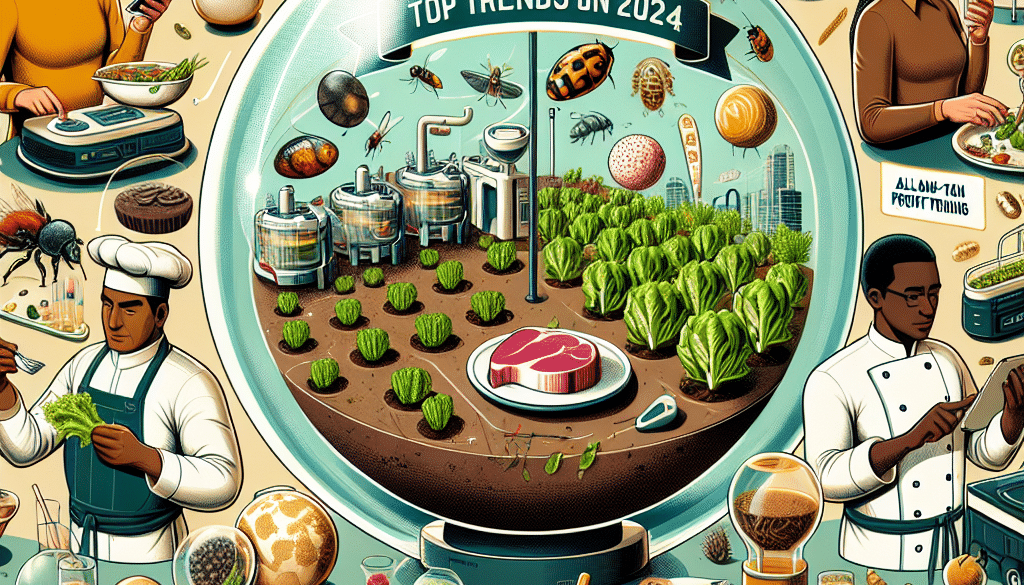The Future of Food: Top Trends in 2024
-
Table of Contents
- The Future of Food: Emerging Trends in 2024
- 1. Plant-Based Revolution Continues
- 2. Cellular Agriculture and Lab-Grown Foods
- 3. Personalized Nutrition and Functional Foods
- 4. Sustainability and Ethical Sourcing
- 5. Technological Innovations in Agriculture and Food Production
- 6. The Rise of Alternative Proteins
- Conclusion
- Discover ETChem’s Protein Products
The Future of Food: Emerging Trends in 2024

The food industry is constantly evolving, shaped by technological advancements, environmental concerns, and changing consumer preferences. As we look towards 2024, several key trends are poised to influence the future of food. This article explores these trends, offering insights into how they may reshape our eating habits and food production in the coming years.
1. Plant-Based Revolution Continues
The plant-based food trend is not just a fad; it’s a movement that’s gaining momentum. With concerns over health, sustainability, and animal welfare driving consumer choices, plant-based alternatives to meat and dairy products are becoming increasingly sophisticated and widely available.
- Advancements in food technology are leading to more realistic meat and dairy substitutes that appeal to a broader audience, not just vegans and vegetarians.
- Investment in plant-based startups is soaring, indicating a strong belief in the long-term viability of this sector.
- Case studies, such as Beyond Meat and Impossible Foods, showcase the potential for plant-based products to disrupt traditional meat industries.
2. Cellular Agriculture and Lab-Grown Foods
Cellular agriculture is a groundbreaking technology that allows for the production of animal products directly from cells, without the need to raise and slaughter animals. This trend is expected to grow significantly by 2024:
- Lab-grown meats are approaching commercial viability, with several companies planning to launch their products in the next few years.
- Environmental benefits, such as reduced greenhouse gas emissions and lower water usage, are major selling points for lab-grown foods.
- Regulatory approval will play a crucial role in the adoption of cellular agriculture products.
3. Personalized Nutrition and Functional Foods
As consumers become more health-conscious, personalized nutrition and functional foods are becoming more popular. These trends focus on tailoring diets to individual needs and enhancing foods with additional health benefits:
- Advances in genomics and biotechnology enable personalized diet plans based on genetic makeup, lifestyle, and health goals.
- Functional foods, enriched with vitamins, minerals, probiotics, and other health-promoting substances, are in high demand.
- Statistics show a growing market for functional beverages, snacks, and supplements that support immune health, mental clarity, and energy levels.
4. Sustainability and Ethical Sourcing
Sustainability is a major concern for consumers, and this is reflected in their purchasing decisions. Ethical sourcing and environmentally friendly practices are becoming critical for food producers:
- Local sourcing and shorter supply chains are gaining popularity as a means to reduce carbon footprints.
- Regenerative agriculture practices that improve soil health and biodiversity are being adopted by forward-thinking farmers.
- Food waste reduction initiatives are becoming more sophisticated, with innovative solutions for repurposing and recycling food byproducts.
5. Technological Innovations in Agriculture and Food Production
Technology is revolutionizing the way we grow and produce food. By 2024, we can expect to see more widespread adoption of these innovations:
- Vertical farming and hydroponics allow for year-round crop production in urban environments, reducing the need for transportation and improving freshness.
- Artificial intelligence and machine learning are optimizing crop yields and reducing resource usage.
- Blockchain technology is enhancing traceability and transparency in the food supply chain, building consumer trust.
6. The Rise of Alternative Proteins
Alternative proteins, such as insects, algae, and fungi, are becoming more mainstream as sustainable protein sources:
- Insect protein is a nutrient-dense and environmentally friendly option that’s slowly overcoming cultural barriers.
- Algae and fungi offer unique flavors and textures, expanding the culinary possibilities for plant-based diets.
- Investment in alternative protein research is growing, indicating potential breakthroughs in the near future.
Conclusion
The future of food in 2024 is shaping up to be an exciting convergence of health, technology, and sustainability. From the continued rise of plant-based diets to the advent of lab-grown meats and personalized nutrition, the food industry is undergoing a transformation. Ethical sourcing and technological advancements in agriculture are set to create a more sustainable and efficient food system. As alternative proteins gain acceptance, they will play a crucial role in meeting the global demand for protein in an eco-friendly manner. These trends not only reflect the changing preferences of consumers but also the industry’s response to global challenges such as climate change and food security.
Discover ETChem’s Protein Products
As we embrace these food trends, it’s important to have access to high-quality protein sources. ETChem’s protein products stand out in the market for their exceptional quality and versatility. Whether you’re looking for marine, fish, bovine, chicken, or various types of collagen, ETChem has a solution for you. Their products are perfect for a range of industries, from nutraceuticals to food and beverage. With a commitment to sustainability and customer satisfaction, ETChem is your go-to source for protein needs in 2024 and beyond.
About ETChem:
ETChem, a reputable Chinese Collagen factory manufacturer and supplier, is renowned for producing, stocking, exporting, and delivering the highest quality collagens. They include marine collagen, fish collagen, bovine collagen, chicken collagen, type I collagen, type II collagen and type III collagen etc. Their offerings, characterized by a neutral taste, instant solubility attributes, cater to a diverse range of industries. They serve nutraceutical, pharmaceutical, cosmeceutical, veterinary, as well as food and beverage finished product distributors, traders, and manufacturers across Europe, USA, Canada, Australia, Thailand, Japan, Korea, Brazil, and Chile, among others.
ETChem specialization includes exporting and delivering tailor-made collagen powder and finished collagen nutritional supplements. Their extensive product range covers sectors like Food and Beverage, Sports Nutrition, Weight Management, Dietary Supplements, Health and Wellness Products, ensuring comprehensive solutions to meet all your protein needs.
As a trusted company by leading global food and beverage brands and Fortune 500 companies, ETChem reinforces China’s reputation in the global arena. For more information or to sample their products, please contact them and email karen(at)et-chem.com today.




